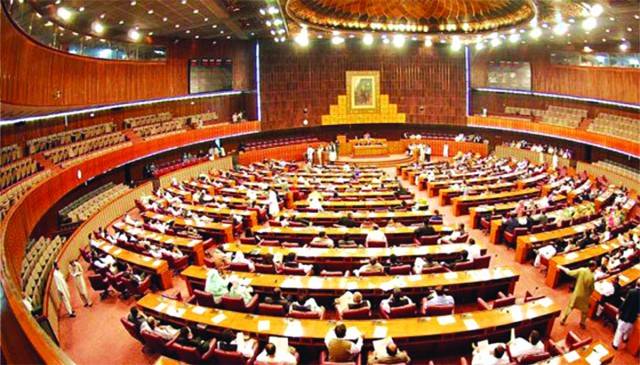
Most human rights violations take place at the hands of the government’s law enforcement agencies, either through misuse or abuse of power against citizens. Whether it is the FC or the Rangers, unaccountable intelligence agencies or the police, most violations of human rights are traced to one or the other government agency. That is why parliamentary committees on human rights in the National Assembly and the Senate are headed by the opposition. It is only logical: opposition can hold to account agencies of the government in the enforcement of fundamental human rights of citizens.
It was therefore shocking when opposition parties abandoned the chairmanship of senate human rights committee to the government last week.
Initially the committee was allotted to the opposition as per tradition, and the PPP wanted to have it. However, the PML-N argued that since the PPP already chaired the human rights committee in the National Assembly, the senate committee should go to it (the PML-N). The PPP readily agreed to this proposal. The PML-N nominated Mushahid Hussain Syed for the position and all members of the committee were informed so as to vote for him. Mushahid had ably served on a human rights committee before and his nomination was welcomed ungrudgingly.
But just when committee members were gathering in the committee room to elect him as their chairman, Mushaid Hussain traded the human rights committee with the Defence Committee which traditionally is chaired by a senator from the ruling coalition. Whether Hussain consulted his party or not is not known. However, other opposition parties in the Senate claimed they were not even informed, let alone consulted. They were understandably shocked.
The PPP then mounted an unsuccessful bid to reclaim the human rights committee. It claims to have offered trading the Inter Provincial Committee (IPC) with the human rights committee but failed. The crucial human rights committee thus went to the government and given the right to sit in judgment over allegations of rights violations against itself.
The human rights situation in Pakistan, as with other countries, is subject to periodic review by the UN, known as Universal Periodic Review (UPR). In our case, the human rights record is also periodically reviewed by the European Commission to determine continuity, or otherwise, of the GSP Plus status, an instrument of economic windfall for the country’s exports.

During previous reviews, while concern has been expressed over “human rights violations being widespread in the country,” Pakistan was also commended for “constructive initiatives” such as “strengthening the institutional framework for human rights.”
Based on such reports the EU has renewed Pakistan’s GSP Plus status every two years.
The ‘institutional framework’ refers to various statutory human rights bodies, including the Human Rights Committees of the Parliament, the National Commission on Human Rights (NCHR), the National Commission on the Status of Women (NCSW), the National Commission on Minorities and the National Commission on the Rights of the Child (NCRS). It also refers to appropriate legislation to keep in check various governmental organs.
The edifice of institutional framework for the protection of human rights has already been more than demolished during the last two years.
Today there is no NCHR, no NCSW and no statutory commission on minorities. The Commission on the Rights of the Child (NCRC) set up after a long delay has been obstructed by systemic handicaps.
Today there is no legislation to regulate the functioning of and determination of the mandate of the country’s intelligence agencies. The premier intelligence agency is functioning as a law unto itself, a government within government, indeed as a state within the state.
Three attempts made in the parliament during the past few years to bring the ISI under the law were foiled. The latest attempt was made only last month in the National Assembly when the mover of a private member bill was told that it will not even be taken up on the agenda. In 2015, the Senate Committee of Whole adopted this legislation but was rebuffed. In February 2019, the Supreme Court in its verdict in the Faizabad dharna case also asked for such legislation. It too has been ignored.
The status of the human rights committee was also changed from a functional committee to that of a standing committee. A standing committee conducts accountability of only the concerned ministry whereas the scope of a functional committee is determined by the nature of its functions and not confined to the administrative boundaries of a ministry.
By handing over the Senate committee on human rights to the government, the ‘institutional framework’ to safeguard human rights has been dealt a death blow.
To be fair, the responsibility for this debacle rests with the opposition. They owe an explanation to the parliament, the people and to national and international human rights bodies and defenders. It will also be no surprise if the next periodic review of Pakistan’s human rights record deplores weakening of the institutional framework for human rights.
The writer has been a member of the Senate Human Rights Committee
It was therefore shocking when opposition parties abandoned the chairmanship of senate human rights committee to the government last week.
Initially the committee was allotted to the opposition as per tradition, and the PPP wanted to have it. However, the PML-N argued that since the PPP already chaired the human rights committee in the National Assembly, the senate committee should go to it (the PML-N). The PPP readily agreed to this proposal. The PML-N nominated Mushahid Hussain Syed for the position and all members of the committee were informed so as to vote for him. Mushahid had ably served on a human rights committee before and his nomination was welcomed ungrudgingly.
But just when committee members were gathering in the committee room to elect him as their chairman, Mushaid Hussain traded the human rights committee with the Defence Committee which traditionally is chaired by a senator from the ruling coalition. Whether Hussain consulted his party or not is not known. However, other opposition parties in the Senate claimed they were not even informed, let alone consulted. They were understandably shocked.
The PPP then mounted an unsuccessful bid to reclaim the human rights committee. It claims to have offered trading the Inter Provincial Committee (IPC) with the human rights committee but failed. The crucial human rights committee thus went to the government and given the right to sit in judgment over allegations of rights violations against itself.
The human rights situation in Pakistan, as with other countries, is subject to periodic review by the UN, known as Universal Periodic Review (UPR). In our case, the human rights record is also periodically reviewed by the European Commission to determine continuity, or otherwise, of the GSP Plus status, an instrument of economic windfall for the country’s exports.

During previous reviews, while concern has been expressed over “human rights violations being widespread in the country,” Pakistan was also commended for “constructive initiatives” such as “strengthening the institutional framework for human rights.”
Based on such reports the EU has renewed Pakistan’s GSP Plus status every two years.
The ‘institutional framework’ refers to various statutory human rights bodies, including the Human Rights Committees of the Parliament, the National Commission on Human Rights (NCHR), the National Commission on the Status of Women (NCSW), the National Commission on Minorities and the National Commission on the Rights of the Child (NCRS). It also refers to appropriate legislation to keep in check various governmental organs.
The edifice of institutional framework for the protection of human rights has already been more than demolished during the last two years.
Today there is no NCHR, no NCSW and no statutory commission on minorities. The Commission on the Rights of the Child (NCRC) set up after a long delay has been obstructed by systemic handicaps.
Today there is no legislation to regulate the functioning of and determination of the mandate of the country’s intelligence agencies. The premier intelligence agency is functioning as a law unto itself, a government within government, indeed as a state within the state.
Three attempts made in the parliament during the past few years to bring the ISI under the law were foiled. The latest attempt was made only last month in the National Assembly when the mover of a private member bill was told that it will not even be taken up on the agenda. In 2015, the Senate Committee of Whole adopted this legislation but was rebuffed. In February 2019, the Supreme Court in its verdict in the Faizabad dharna case also asked for such legislation. It too has been ignored.
The status of the human rights committee was also changed from a functional committee to that of a standing committee. A standing committee conducts accountability of only the concerned ministry whereas the scope of a functional committee is determined by the nature of its functions and not confined to the administrative boundaries of a ministry.
By handing over the Senate committee on human rights to the government, the ‘institutional framework’ to safeguard human rights has been dealt a death blow.
To be fair, the responsibility for this debacle rests with the opposition. They owe an explanation to the parliament, the people and to national and international human rights bodies and defenders. It will also be no surprise if the next periodic review of Pakistan’s human rights record deplores weakening of the institutional framework for human rights.
The writer has been a member of the Senate Human Rights Committee

